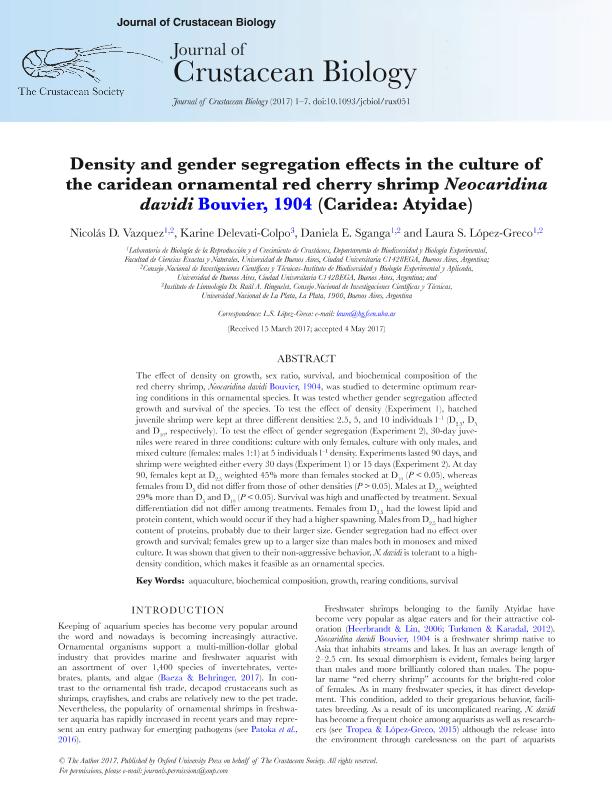Artículo
Density and gender segregation effects in the culture of the caridean ornamental red cherry shrimp Neocaridina davidi Bouvier, 1904 (Caridea: Atyidae)
Fecha de publicación:
07/2017
Editorial:
Crustacean Society
Revista:
Journal of Crustacean Biology
ISSN:
0278-0372
Idioma:
Inglés
Tipo de recurso:
Artículo publicado
Clasificación temática:
Resumen
The effect of density on growth, sex ratio, survival, and biochemical composition of the red cherry shrimp, Neocaridina davidi Bouvier, 1904, was studied to determine optimum rearing conditions in this ornamental species. It was tested whether gender segregation affected growth and survival of the species. To test the effect of density (Experiment 1), hatched juvenile shrimp were kept at three different densities: 2.5, 5, and 10 individuals l-1 (D2.5, D5 and D10, respectively). To test the effect of gender segregation (Experiment 2), 30-day juveniles were reared in three conditions: culture with only females, culture with only males, and mixed culture (females: males 1:1) at 5 individuals l-1 density. Experiments lasted 90 days, and shrimp were weighted either every 30 days (Experiment 1) or 15 days (Experiment 2). At day 90, females kept at D2.5 weighted 45% more than females stocked at D10 (P < 0.05), whereas females from D5 did not differ from those of other densities (P > 0.05). Males at D2.5 weighted 29% more than D5 and D10 (P < 0.05). Survival was high and unaffected by treatment. Sexual differentiation did not differ among treatments. Females from D2.5 had the lowest lipid and protein content, which would occur if they had a higher spawning. Males from D2.5 had higher content of proteins, probably due to their larger size. Gender segregation had no effect over growth and survival; females grew up to a larger size than males both in monosex and mixed culture. It was shown that given to their non-aggressive behavior, N. davidi is tolerant to a highdensity condition, which makes it feasible as an ornamental species.
Palabras clave:
Aquaculture
,
Biochemical Composition
,
Growth
,
Rearing Conditions
,
Survival
Archivos asociados
Licencia
Identificadores
Colecciones
Articulos(IBBEA)
Articulos de INSTITUTO DE BIODIVERSIDAD Y BIOLOGIA EXPERIMENTAL Y APLICADA
Articulos de INSTITUTO DE BIODIVERSIDAD Y BIOLOGIA EXPERIMENTAL Y APLICADA
Citación
Vázquez, Nicolás Darío; Delevati Colpo, Karine; Sganga, Daniela Eliana; Lopez, Laura Susana; Density and gender segregation effects in the culture of the caridean ornamental red cherry shrimp Neocaridina davidi Bouvier, 1904 (Caridea: Atyidae); Crustacean Society; Journal of Crustacean Biology; 37; 4; 7-2017; 367-373
Compartir
Altmétricas




